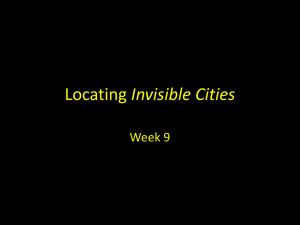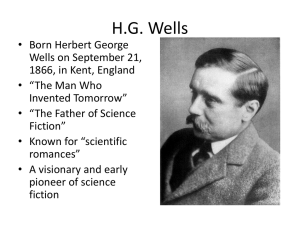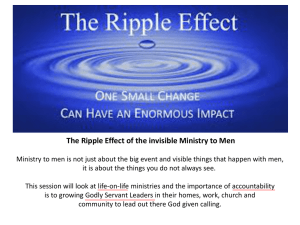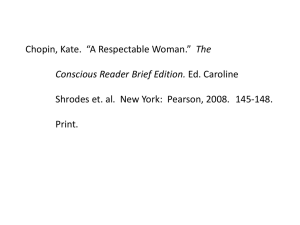Invisible Man
advertisement
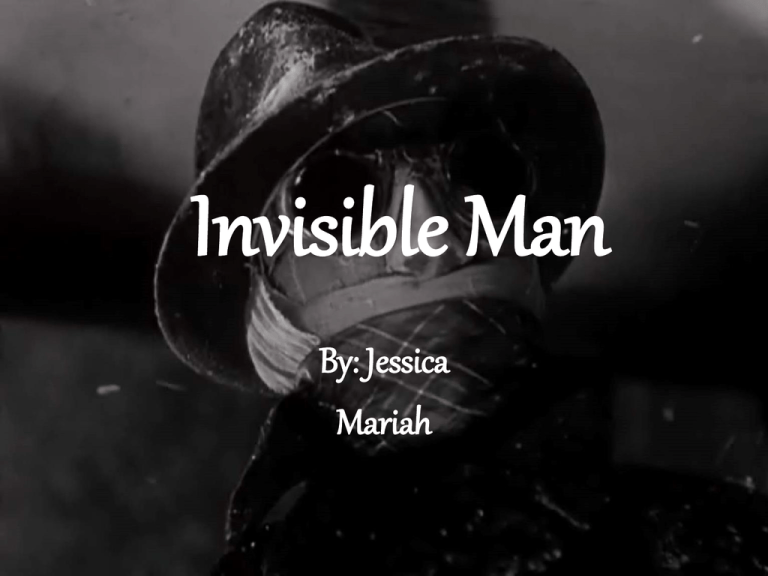
Invisible Man By: Jessica Mariah Book Info. • Title: Invisible Man • Author: H.G Wells • Publishing Info: Dover Publications INC • Date: First Edition was published in 1897 This edition was published in 1992. • (Wells III) Setting •Iping, England in the 1890’s. Character Descriptions • Griffin: – He is the main character in this story. He is described to be an albino college student who majored in physics and medicine. During his expirements he came across formulas that causes himself to turn invisible. He ends up becoming the burglar in the story. Character Description • Mr. Marvel: – This is the first man that Griffin attempts to make his accomplice. He is described to be short, fat and un liked by all. Also the area tramp. He betrays Griffin. Character Description • Dr Kemp: – Used to go to university with Griffin. He is interested in the bizarre aspects of science. Griffin comes Dr. Kemp in attempt to make him his accomplice, and even though Dr. Kemp acts as though he is agreement with Griffin, he still betrays him. Character Description • Teddy Henfrey: – Teddy Henfrey is a clock repairman who Mrs. Hall uses in attempt to find out more about Griffin. But because Griffin doesn’t speak much, Teddy begins rumors about Griffin stating that he is wanted man. Literary Elements • Tone: Throughout the novel, you get a sense of mystery, suspense and often a bit of arrogance when the author was speaking of Griffin. Literary Elements • Theme: Corruption of Morals in the Absence of Social Restriction – For example: For everything that Griffin did, he had an excuse for it. When he killed his father he excused it by saying that he was a “sentimental fool”. Literary Element: • Conflict: – Throughout the novel many people are trying to figure out Griffin in a whole. Why isn’t he showing himself? What does he have to hide? Griffin shows to have no compassion for anyone in his attempt to survive invisible without others finding out. His main conflict is finding an antidote to become visible. The society’s conflict is finding out who is the burglar that is breaking in and stealing. Literary Element • Point-of-View: – In the first half of the story, it is told through third person. Giving us the opportunity to meet and get to know the characters and their inner personality. – The second half Griffin takes over and gives us a taste of his inner side, and his history. After chapter 25, the story returns third person. Quotes (Jessica) • “He rarely went abroad by daylight, but at twilight he would go out muffled up invisibly, whether • the weather were cold or not, and he chose the loneliest paths and those most over-shadowed by trees and banks.” – This quote reflects the irony that Griffin must cover up invisibility by becoming invisible and blending into his surroundings. (Page 21) Critical Analysis (Jessica) • This story reflects a strong message. There are decisions often that need to be made. But when in the process of deciding on your actions you must weigh the advantages as well as the disadvantages of your decision. You also must see how it will affect those around you. In the novel Griffin didn’t think of the consequences of turning himself invisible not only for himself as well as the society. Biography • Sometimes called the father of modern science fiction, H.G. Wells was born on September 21, 1866 in Bromley, Kent, England. His father, a professional cricket player and shopkeeper, and his mother, a former lady's maid, raised Wells with the idea that he would find a place in the work world that they were accustomed. He aspired to a different place in society. Biography • When he was thirteen, he left school to become a draper's apprentice, a job his family expected would be proper for a boy of his station. Then H.G. Wells finally found a job as a teacher's assistant in a grammar school. Education and academia suited him well. In 1884 he entered college with a scholarship to study biology. He was able to study under one of the great biology teachers of the time, Thomas Henry Huxley, and Wells graduated in 1888. Biography • The writings of Jules Verne undoubtedly influenced Wells, and he wrote his first novel, The Time Machine, partly in response to this new kind of literature that Verne produced. The story appeared in various forms in magazines from 1888 to 1894 and was released in its current form in 1895. The book was successful, and Wells did not need to teach or worry about money from that time on. Biography • Wells' early novels continued in the science fiction mode of The Time Machine. The Island of Dr. Moreau (1896), The Invisible Man (1897) and The War Between the Worlds (1898) cemented his position within the genre. For many readers, these early novels are the extent of Wells' writing. He's the "time machine guy" or the "Martian guy." Wells, however, wrote short stories, mainstream fiction and non-fiction essays his entire life, most of them espousing in some form or another his views on humanity, society and the direction he saw the world going. Some of these works were also science fictional in nature. (The Time Machine) Plot Summary • It begins with a mysterious man walking into a small town’s bed and breakfast. This stranger wears a long, thick coat, gloves; his face is hidden entirely by bandages, large goggles, and a wide-brimmed hat. The stranger is extremely reclusive and demands to be left alone, spending most of his time in his room working with a set of chemicals and laboratory apparatus, only venturing out at night. He quickly becomes the talk of the village as he unnerves the locals. Plot Summary • Meanwhile, a series of mysterious burglaries occur in the village in which the victims catch no sight of the thief. One morning when the innkeepers pass the stranger's room, they enter in curiosity when they notice the stranger's clothes are scattered all over the floor but the stranger is nowhere to be seen. The furniture seems to spring alive and the bedclothes and a chair leap into mid-air and push them out of the room. Later in the day Mrs. Hall confronts the stranger about this, and the stranger reveals that he is invisible, removing his bandages and goggles to reveal nothing beneath. As Mrs. Hall flees in horror, the police attempt to catch the stranger, but he throws off all his clothes and escapes. Plot Summary • The Invisible Man flees to the downs, where he frightens a tramp, Thomas Marvel, with his invisibility and forces him to become his lab assistant. Together with Marvel, he returns to the village where Marvel steals the Invisible Man's books and apparatus from the inn while the Invisible Man himself steals the doctor's and vicar's clothes. But after the theft, Marvel attempts to betray the Invisible Man to the police, and the Invisible Man chases after him, threatening to kill him. Plot Summary • Marvel flees to the seaside town of Burdock where he takes refuge in an inn. The Invisible Man attempts to break in through the back door but he is overheard and shot by a black-bearded American, and flees the scene badly injured. He enters a nearby house to take refuge and dress his wound. The house turns out to belong to Dr. Kemp, whom the Invisible Man recognizes, and he reveals to Kemp his true identity — Griffin, a brilliant medical student with whom Kemp studied at university. Plot Summary • Griffin explains to his old friend Kemp that after leaving university he was desperately poor. Determined to achieve something of scientific significance, he began to work on an experiment to make people and objects invisible, using money stolen from his own father, who committed suicide after being robbed by his son. Griffin experimented with a formula that altered the refractive index of objects, which resulted in light not bending when passing through the object, thereby making it invisible. Plot Summary • He performed the experiment using a cat, but when the cat's owner, Griffin's neighbor, realized the cat was missing, she made a complaint to their landlord, and Griffin wound up performing the invisibility procedure on himself to hide from them. Griffin theorizes part of the reason he can be invisible stems from the fact he is albino, mentioning that food becomes visible in his stomach and remains so until digested, with the bizarre image passing through air in the meantime. Plot Summary • After burning the boarding house down to cover his tracks, he felt a sense of invincibility from being invisible. After struggling to survive out in the open, he stole some clothing from a dingy backstreet shop and took residence at the Coach & Horses inn to reverse the experiment. He then explains to Kemp that he now plans to begin a Reign of Terror (The First Year of the Invisible Man the First), using his invisibility to terrorize the nation with Kemp as his secret confederate. Plot Summary • Realizing that Griffin is clearly insane, Kemp has no plans to help him and instead alerts the police. When the police arrive, Griffin violently assaults Kemp and a policeman before escaping, and the next day he leaves a note on Kemp's doorstep announcing that Kemp will be the first man killed in the Reign of Terror. Kemp remains cool and writes a note to the Colonel, detailing a plan to use himself as bait to trap the Invisible Man, but as a maidservant attempts to deliver the note she is attacked by Griffin and the note is stolen. Plot Summary Plot Summary • Just as the police accompany the attacked maid back to the house, the Invisible Man breaks in through the back door and makes for Kemp. Keeping his head cool, Kemp bolts from the house and runs down the hill to the town below, where he alerts a navvy (a navigator or a navigational engineer.) that the Invisible Man is approaching. In town witnessing the pursuit, the crowd rally around Kemp. Plot Summary Plot Summary • When Kemp is pinned down by Griffin, the navvy strikes him with a spade and knocks him to the ground, and he is violently assaulted by the workers. Kemp calls for the mob to stop, but it is too late. The Invisible Man dies of the injuries he has received, and his naked and battered body slowly becomes visible on the ground after he dies. Quote Quote (Mariah) • "Alone--(Mariah) it is wonderful how little a man can do alone! To rob a little, to hurt a little, and there is the end." Critical Analysis (Mariah) • It was a good read, and exceptionally short. The story depicts that obsession of just about anything can cause insanity; it caused a fictional character to kill and rob innocent people only because he was invisible. The Invisible Man was a good quality sciencefiction book, and I would recommend it to my peers. ources Work Cited • "Well's Biography." SFF Net. The Time Machine. Web. 27 Nov. 2010. <http://www.sff.net/people/james.van.pelt /wells/biography.htm>. • Wells, H. G. Invisible Man. Mineola, NY: Dover., 1992. Print. Work Division • Jessica: – – – – Setting Character Descriptions Literary Elements Power Point • Mariah: – Author Mini Biography – Plot Summary

